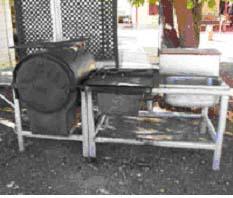Tjurubalan Furniture Resource Centre

CDEP and Adult Education programs that operate within the region have developed a pool of skilled metal workers that have no jobs at present. An opportunity exists in an open market to develop appropriate occasional and essential furniture for residents of the region in a micro or medium sized business. The region is due to undertake major household upgrades and this represents a fabulous opportunity to create quality base furniture specifically designed for the conditions and what the customers want at an affordable cost. Opportunities also exist for the design and construction of signage, street furniture and shelters for tourism infrastructure. Labour costs may be funded through the CDEP program initially and this allows part time employment for approximately 6 full time jobs. Training and development of employees is minimal due to participants already possessing some relevant skills however technical advice, marketing and business mentoring is essential. Outcomes of this business would high job satisfaction and the creation of real jobs that would have significant social benefits.<p>
<h2>Keypoints</h2>
The proposal is to <p>
<ul>
<li>develop a furniture making business in Balgo using metal manufactured products marketed to all of the communities within the region and resourced by trained qualified CDEP participants with the assistance of a business and technical mentor.</li>
<li>the goal is to create a furniture manufacturing business that offers appropriate designed furniture and structures for remote communities. The designs are required to be simple, innovative and practical, produced at a low cost to the purchaser. Items can be made to order or in a standard range of marketable furniture products.</li>
<li>Subject to the nature of any proposal, a community owned company or micro business. </li>
<li>The community could provide the CDEP labour, marketing and a suitable workshop at Balgo. </li>
<li> The community investment could be to own the business, provide the labour, equipment and infrastructure but would require the services of a manger interested in the development of the business, prepared to act as mentor and have industry knowledge technical expertise and experience within the metal working and engineering industry.</li>
<li>The community of Balgo has an excellent pool of qualified trained CDEP participants that are creative and keen to posess a meaningful job. The Balgo Community has a history of creative Indigenous Australians that already produce some of Australias most outstanding Indigenous art, glassware and sculpture through the Warlayirti Art Centre.</li>
<li>Based in Balgo where a pool of qualified enthusiastic job seekers are placed. The Wirramanu Aboriginal Corporation also has the infrastructure and support to facilitate the business.</li>:
<li>The need for a furniture manufacturing business is essential and requires implementation and planning now.</li>
</ul>
<h2>Background</h2>
The COAG WA Trial Site which includes the Tjurabalan Native Title Land Corporation and 5 communities of Ringer Soak (Kundat Djaru), Billiluna (Mindibungu), Mulan, Balgo (Wirrimanu) and Yagga Yagga provides an opportunity for a furniture manufacturing business. Currently furniture such as beds, kitchen and dining tables, chairs, wardrobes, TV cabinets, benches and occasional furniture are purchased through the community or regional stores.<p>
Due to the isolation of the area from regional centres and the high cost of transportation as furniture creates a large surface area, it is proving to be expensive to transport long distances. This has caused these common household essential items to be priced beyond the reach of community members of the district. .<p>
Although community stores provide an adequate service to the region they cannot compete competitively with regional centres for furniture. This is caused by lack of support for bulk purchasing and high transport costs. Second-hand furniture has been an experiment within the region. Due to the adverse road conditions and the fragile nature of second-hand furniture and the often poor samples purchased, this has not been successful venture. Furthermore second-hand furniture often cannot be disassembled making transport cost even higher. An example would be a wardrobe purchased second hand would triple in cost to the purchaser. .<p>
<
<h2>How much capital is required</h2>
Capital required is minimal and could be phased to match business expansion:<p>
<table>
<th>Equipment</th><th>Cost</th><tr>
<td>Industrial pipe bending apparatus</td> <td>$8,000</td><tr>
<td>Lathes and industrial equipment</td> <td>$12,000</td><tr>
<td>Welding Equipment</td> <td>$8,000</td><tr>
<td>Office equipment</td> <td>$2,500</td><tr>
<td>Spray painting equipment and compressors</td> <td>$4,000</td><tr>
<td>Storage racks for metals</td> <td>$5,000</td><tr>
<td>Building applications and fit out</td> <td>$40,000</td><tr>
<td>Total</td> <td>$79,500</td><tr>
</table>
Who to contact to develop this proposal:<p>
Mr Peter Grundy Office of Aboriginal Economic Development 08 91681044 peter.grundy@doir.wa.gov.au<p>
Mr Noel Mason Wirrimanu Aboriginal Corporation 08 91688619 balgoceo@bigpond.com<p>
Mr Daniel Owen DOTARS Canberra 02 6274 8001
daniel.owen@dotars.gov.au <p>
